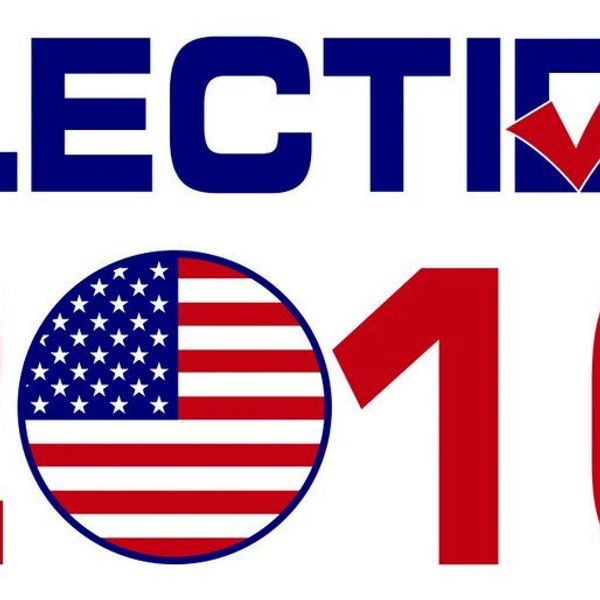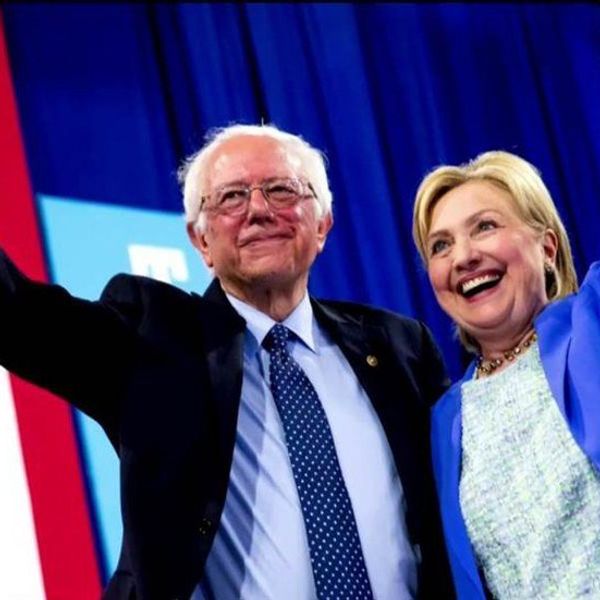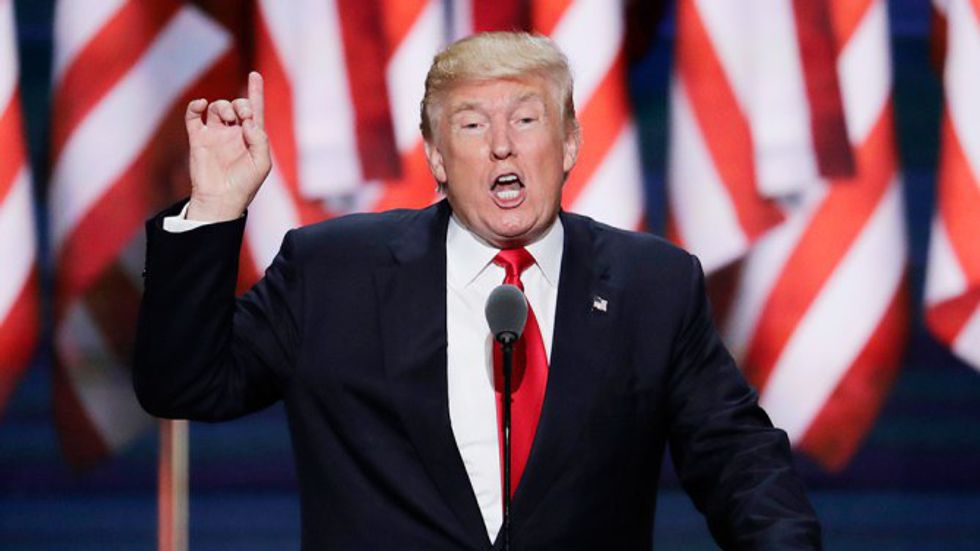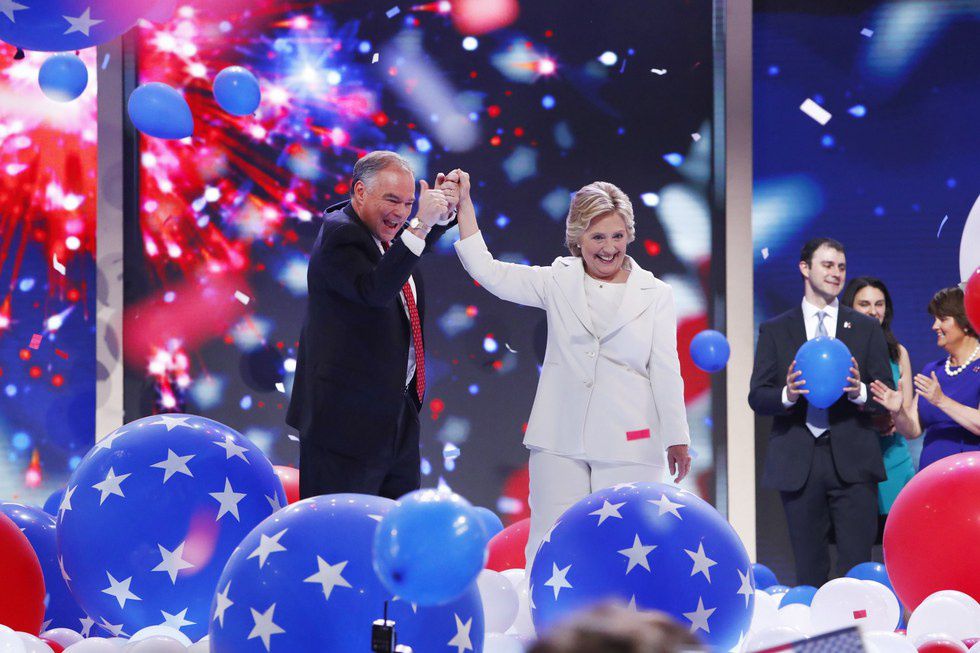Both the 2016 Republican (RNC) and Democratic National conventions (DNC) were rife with excitement, controversy, and strong rhetoric. These national conventions are big opportunities for presidential candidates to re-express their platforms, build new alliances, gain new supporters, and strengthen their positions as the official nominees of their parties. Both Hillary Clinton and Donald Trump gave speeches that conveyed the themes of their platforms and thoroughly roused their crowds of supporters, but the real drama may have surrounded some other speeches at the conventions.
Melania Trump had one of the first notable, arguably the most controversial, speeches at the RNC in Cleveland, OH. She came under scrutiny following many accusations about her plagiarism of Michelle Obama’s 2008 DNC speech. Of course, the Trump campaign denied these claims. Trump campaign chairman, Paul Manafort, explained that there were “not that many similarities” between the two speeches. He went on to say that Michelle Obama and Melania Trump must feel “similar sentiments” about their families and that the allegations were a “crazy… [strategy] for Hillary Clinton...to demean [Melania] and take her down.”
From my perspective, the evidence made clear that Melania and/or her speech writers plagiarised Michelle’s speech. While Trump’s words were not a direct and exact copy of Michelle’s words in total, the construction of the words and ideas expressed in key areas of both speeches were too similar for a mere coincidence.
On the second night of the RNC, Chris Christie’s speech mainly focused on Hillary, characterizing her as a criminal that is guilty and should be locked up; these points largely referred to Clinton’s email scandal, fueled by anger at her lack of indictment. Christie received much praise from supporters and inspired the crowd to chant “lock her up” repeatedly. Ben Carson also spoke negatively about Clinton, decrying her purported connection to Lucifer and making multiple appeals to God as a necessity in our nation.
However, on the third night, Ted Cruz spoke and exhorted the audience to vote their “conscience,” for someone who will be “faithful to the Constitution,” rather than endorse Trump; he was continuously booed thereafter and he later received heavy backlash from Republican leaders and commentators. While Justin Bieber refused a $5 million offer to play at the RNC, Third Eye Blind, a rock band, gave a memorable performance with tones of opposition to the GOP platform at a charity event in Cleveland during the RNC. Lead singer Stephan Jenkins expressed his support for the LGBT community to a crowd of mainly Republican supporters and later criticized the RNC for its lack of diversity via Twitter.
Donald Trump’s running mate and Indiana governor, Mike Pence, gave his speech on the third night in strong support of Trump. He was specific in defending Trump’s lack of political correctness and in supporting law enforcement. On the last night of the convention, Trump gave his acceptance speech. As the self-proclaimed “law and order candidate,” he communicated his disdain for attacks against police and terrorism in American cities. After reaffirming his firm stance on illegal immigration, he turned negative attention to Barack Obama and Hillary Clinton as the embodiments of the status quo; he further attempted to appeal to ardent supporters of former candidate Bernie Sanders by highlighting Clinton’s dishonesty.
While he may not have used hope as a tool to engage and encourage his crowd, Trump painted himself as a future instrument of change for the country. While many minorities have conveyed doubts and even fear of the implications of Trump’s intended changes, he appears consistent in his appeal to the “silent majority;” this idea was formed by Nixon, who Trump has drawn many connections with, to argue that the vast majority of Americans agree with his policies and only a noisy minority disagree. Trump seeks to make similar appeals to the American public. According to a CNN poll, Trump’s poll averages are estimated to have increased by around six points following the RNC.
The DNC had an arguably worse start than that of the RNC. Just a few days prior to the DNC in Philadelphia, PA, Wikileaks, an international organization that publishes secret and classified information and news leaks, released a cache of over 19,000 emails related to the Democratic National Committee. These emails revealed many different aspects of how the committee operated in past months. For one, the emails displayed a clear lack of neutrality on the part of former chairwoman of the Democratic National Committee, Debbie Wasserman Schultz, and other staffers.
It appeared that Schultz had a very apparent bias against Sanders, and she even sought to paint Sanders and his supporters in a negative light by “digging” up dirt. The emails showed “off record” correspondence with multiple mainstream media personnel, including CNN, the Washington Post, and the Wall Street Journal. Many committee staffers seemed to actively undermine Sanders’ campaign, attempting to push negative information and views about Bernie, even interested in using his potential atheism as a tool. The emails also shed more light on details about how the financial and donor system for the committee works, displaying a large list of mainly donors who were to be considered for federal boards and commissions appointments.
While there was no direct proof from the emails that the Clinton campaign colluded with Schultz and the committee against the Sanders campaign, many of his supporters felt that the level of corruption did run that deep; they continued to hold a distrust of both Schultz and Clinton. After the release of the emails and Schultz’s resignation as chairwoman, Hillary Clinton immediately commended Schultz for her leadership, failing to mention the email scandal at all, and hired her as a campaign chairwoman. Following all of this news, many Bernie Sander’s supporters, especially those with the “Bernie or bust” mentality, protested the DNC.
While Bernie attempted to console his supporters in the days before the convention, he was booed by these supporters at the mention of support for Hillary Clinton; he and a few other speakers were later booed again during some of the DNC speeches on the first night. Although many of Sanders’ supporters have been split between interest in Hillary Clinton, who Sanders has endorsed multiple times, third party candidates Gary Johnson and Jill Stein, and just a lack of interest in voting in the election at all, only a minuscule number of them have flocked to support the Trump campaign. According to a Bloomberg Politics National poll, about 22% of Sanders’ supporters intend to vote for Donald Trump.
The DNC as a whole, however, included many influential speeches throughout the evening. Sarah Silverman, a famous comedian and Sanders supporter, was one of the first to directly address fellow supporters and call on them to support Hillary Clinton. New Jersey senator Cory Booker gave an uplifting and hopeful speech to rouse the crowd with ideals such as “love,” “hope,” tolerance, etc., with further support for Clinton. Michelle Obama also later gave a positive and optimistic speech in defense of Clinton and with implicit, succinct jabs at Trump. Drawing on her own experiences and successes as a mother and First Lady, she argued that America is already great in contradiction to Trump’s popular slogan “Make America Great Again.”
Sanders’ speech focused directly on his supporters, as he used key points from his own progressive platform and agenda to encourage and throw support behind Hillary Clinton. He spoke about his concern for middle class workers, socio-economic inequalities, the minimum wage, climate change, and intolerance against different minorities in America. Bill Clinton later spoke in support of Hillary on the second night, mainly focusing on his journey with her over the years, before and after marriage. In an effort to wholly portray Hillary as having good intentions and continuously fighting for positive changes throughout her life, Bill Clinton used humor and charm to express who the “real” Hillary Clinton has been from his perspective.
On the third night of the DNC, prominent businessman and former New York City mayor Michael Bloomberg, an independent, advocated for Hillary Clinton and called Donald Trump a “dangerous demagogue.” Clinton’s running mate and Virginia senator, Tim Kaine, further attacked Trump for his lack of honesty and the lack of specificity in his plans if elected president. Barack Obama’s speech reaffirmed the hopeful theme of the DNC and criticized Trump for his pessimism. He also called Trump unqualified to be president and stated that there has “never been [anyone] more qualified than Hillary Clinton” to be president. On the last day of the convention, lawyer and father of a Muslim-American Captain killed in war, Khizr Khan, criticized Donald Trump for his intended ban on Muslim immigration and expressed his doubts that Trump has ever sacrificed, or even read the Constitution.
Hillary Clinton’s speech encompassed many of the points of other DNC speeches. She highlighted her goals as president: to create jobs, make college affordable, reduce climate change, etc. She condemned Donald Trump for inspiring fear and bigotry, and she also reassured Sanders’ supporters that she has heard them and is with them. While Trump’s speech had more viewers than Clinton’s speech, viewers of Clinton’s speech expressed more positive and favorable views of her, according to a CNN poll. She also received an estimated seven point increase in polls following the convention.
Overall, I think that there was a contrast in the moods and appearances of both conventions. While the RNC and DNC both sought to advertise their platforms to new supporters, they were distinct from each other in their repeated themes and approaches. From my perspective, the Republican National Convention was partially divided from the beginning, especially because some state delegations were reluctant to officially nominate Trump; these states included Ohio, Utah, and Alaska. Although the Clinton campaign appeared more unified with Sanders supporters by the end of just the second day of the DNC, Ted Cruz’s speech on the third night of RNC and the multiple Republicans who have thrown support behind Clinton only proves just how much Trump has divided the party he represents.
As well, the Republican convention seemed to be more unified by anti-Clinton rhetoric, anger about Benghazi, and general finger-pointing at Democrats and the Obama administration. At times, I felt as though GOP leaders favored talking about dismal imagery and pessimistic ideas over painting America with hope and earnest anticipation for the future. The Democratic National Convention seemed to be the opposite, expressing joy and optimism for America, with cheerful explanations of Hillary’s qualifications and goals for the country. The contrast in diversity between the two conventions was also quite obvious. The DNC had a mix of white, black, latino, LGBT, etc. faces and speakers throughout each night, but the RNC did not have such an endowment. Even as the GOP platform and leaders have been criticized for their lack of appeals to the diversity of Americans, I have not noticed any improvements.
In the end, both conventions succeeded in garnering increased support for their platforms and nominees. Hopefully this breakdown of the two conventions has helped to clarify which major party candidate and political party seems more equipped to handle the presidency and positively impact the next four years of this country.























